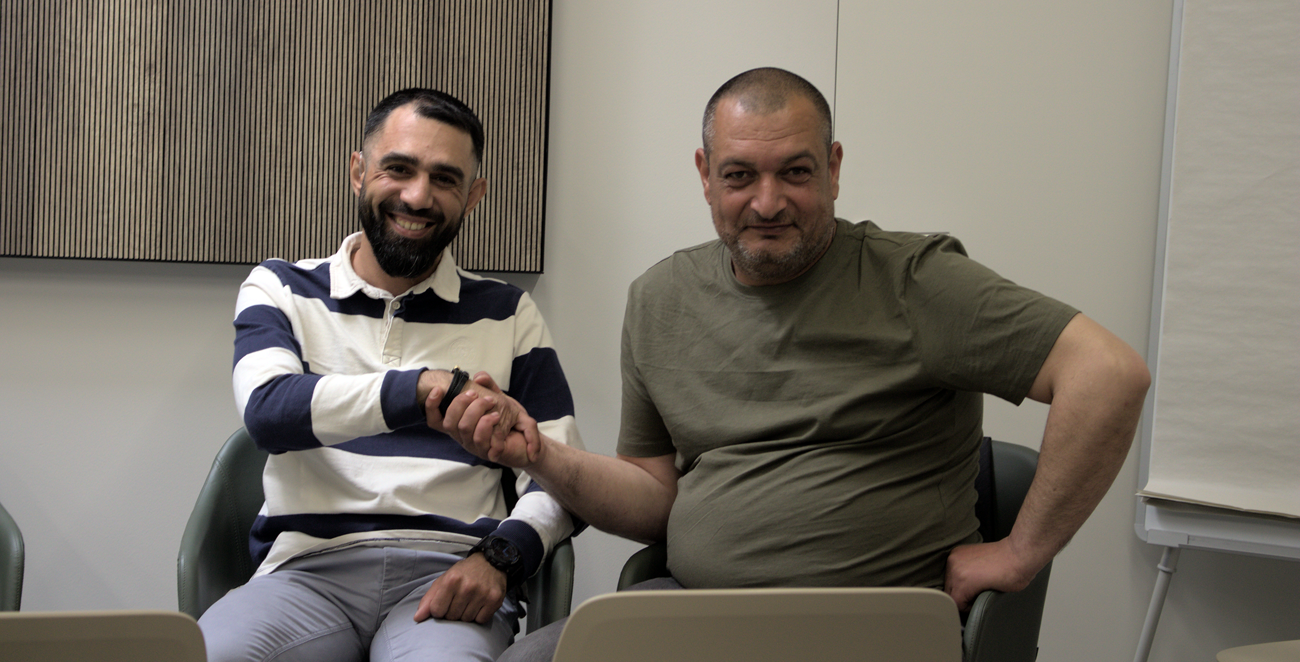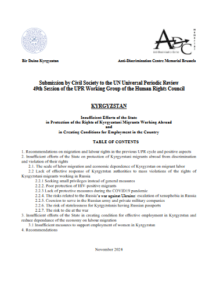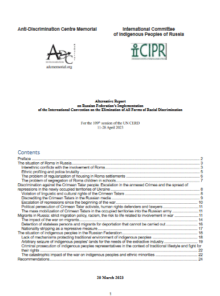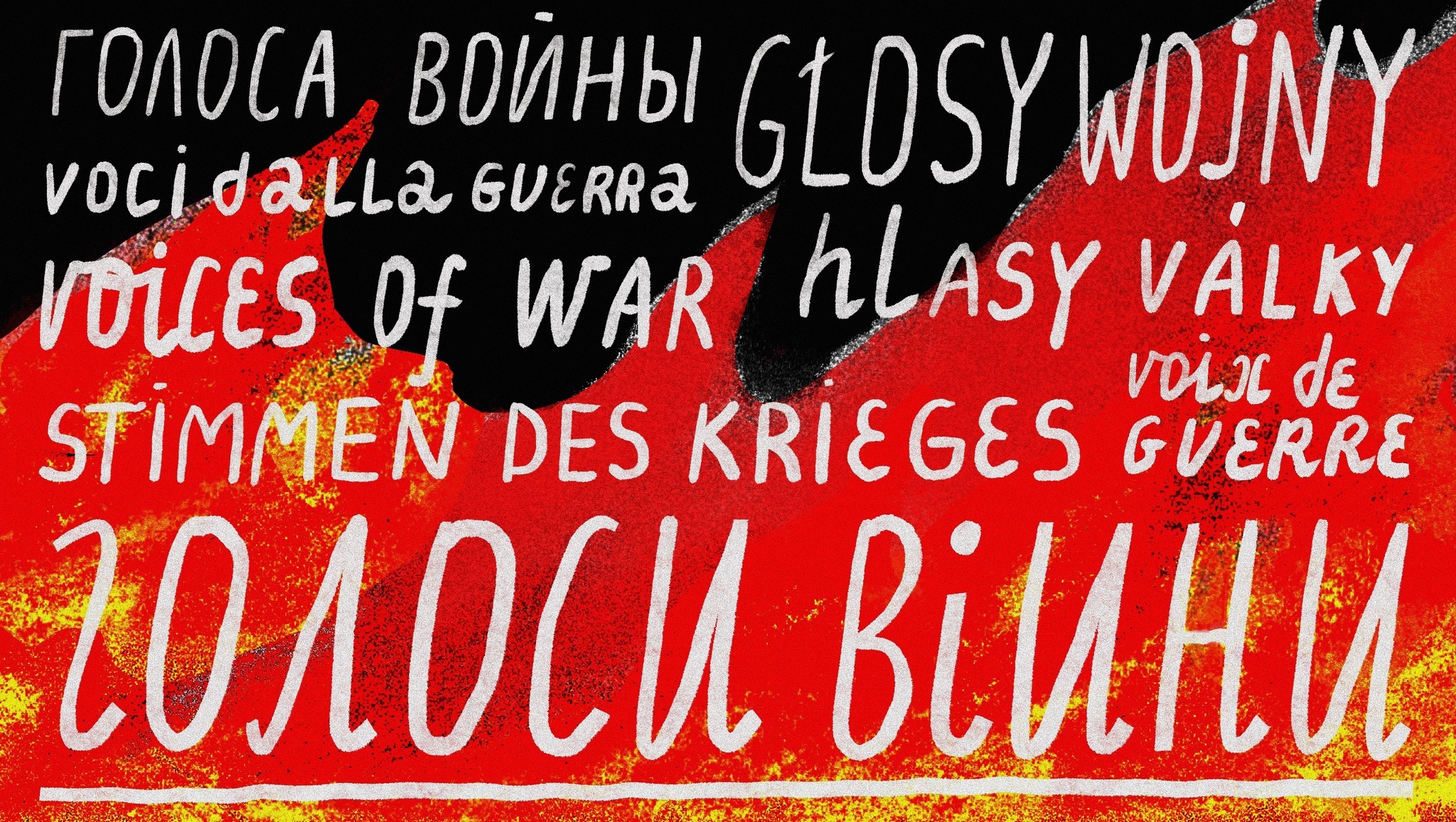March 8, 2022 comes at the most difficult moment when the Russian army launches rocket and artillery strikes on the cities of Ukraine, when millions leave their homes, when thousands are killed and tens of thousands are wounded. In the days of war, violence and chaos, the groups who are vulnerable due to their gender, ethnic origin, documentations status – always suffer more, while women always suffer, among others, from sexualized and gender-based violence.
On the International Women’s Day, we publish an analytical material on the problem of sexual exploitation of women. It focuses on the impact of this type of violence and discrimination against women from vulnerable groups, including representatives of ethnic minorities (Roma), undocumented and stateless women, homeless and unemployed women who do not have the opportunity to protect their rights. The material was prepared before the new terrible war in Ukraine – but in this disastrous time it sounds even more relevant.
Various causes forcing women into prostitution
Sexual exploitation, “independent” prostitution: terminology and scope of the research
Sexual exploitation shall be defined, in the present work, as the coercion of individuals into performing sexual activities for economic compensation or in exchange for goods or services for the benefit of a third party, who generally manages the compensation received by the woman and sets her working conditions. This third party, known as a pimp, may use violence1, psychological manipulation2, or blackmail in order to force the victims into exploitation and to perpetuate it. For the purposes of the present report, the terms “sexual exploitation”, “forced prostitution” and “exploitation of prostitution” will be regarded as synonyms. That is why crimes such as abuse and rape shall not be included in the definition of sexual exploitation used here. Additionally, sexually exploited women are often, though not always, victims of human trafficking. This can be defined as the recruitment and transport of women over national borders through coercion in order to sexually exploit them3.
Prostitution, on the other hand, does not necessarily entail exploitation at the hands of another. We may distinguish the exploitation of prostitution by a third party from those prostitutes that act autonomously and are, in principle, free to choose their working conditions. We will discuss below whether this choice is truly freely made. While all these phenomena are relevant to the discussions in this report, the focus will be on prostitution free from coercion from a third party. When reference is made to one of the other phenomena, this shall be done explicitly.
It is controversial whether prostitution and sexual exploitation are separate phenomena, or whether one influences the other. While it is obvious that there is a difference in the causes forcing women to perform these sexual services, as well as a lack of coercion by another in the case of “independent” prostitution, it has often been argued that the existence of prostitution in an area causes women to be trafficked, due to an increase in demand for these services4. It is also argued that differentiating between the two is not practical for legislation and enforcement combating demand, which is essential in order to end both practices5.
With regards to international legal treatment, the United Nations Convention for the Suppression of the Traffic in Persons and of the Exploitation of the Prostitution of Others differentiates between trafficking and exploitation of prostitution (or sexual exploitation), but it convolutes the two as “incompatible with human dignity”6. As for the Convention on the Elimination of All Forms of Discrimination against Women (“CEDAW”), it requires parties to “take all appropriate measures, including legislation, to suppress all forms of traffic in women and exploitation of prostitution of women”7. When these instruments speak of “exploitation of prostitution of women”, it is referring to what has been defined above as sexual exploitation. Hence, they does not require the elimination of prostitution with no third parties (pimps) involved, but merely that of prostitution whereby women are exploited by others for their economic benefit.
It becomes clear that international law distinguishes “independent” prostitution, where the prostitute is not under a third party’s control, from sexual exploitation and trafficking of persons. However, these last two elements, while different in nature, often receive similar legal treatment When coupled with the variations on the legal treatment of prostitution, sexual exploitation, and trafficking at a national level, the picture becomes less clear.
The debate on free choice
While forced and autonomous prostitution are often distinguished, as we have mentioned above, the circumstances forcing most women into prostitution can be considered equivalent to the coercion that women exploited by a third party face. We will explore these circumstances below, but it is important to note that, where economic coercion or unsafe circumstances such as detention and incarceration are involved, women’s choices are not truly free. Freedom cannot merely be defined as the lack of coercion by another. When circumstances out of one’s control remove or make excessively difficult the access to better options, we cannot speak of freely made choices.
Circumstances making women more vulnerable to prostitution
There is an array of variables that can contribute to women having to resort to prostitution. We shall explore only a few below: poverty, survival sex, incarceration, and being an undocumented migrant. Statelessness, which is often linked to the latter, shall be explored later in this section.
Poverty
Many in the anti-prostitution, abolitionist bloc believe that no woman chooses prostitution freely, but rather is forced to engage in it due to economic coercion and lack of other options8. It must be acknowledged that, while some prostitutes may argue that they prefer it over other available occupations, it is better paid than other low-skilled jobs9, and most prostitutes agree that the reason for beginning or continuing to exercise their occupation is economic10. There may be a problem with the free exercise consent to sexual relations, if this is the only high-paying option to many women in a vulnerable economic situation.
But this argument is not restricted to the fact that poor women might need to resort to prostitution to provide for themselves and for their children. There are two other dimensions to poverty.
First, the cycle of poverty prevents low-income people from improving their economic situation. This refers to the economic cycle whereby lower-income people must spend most of their income to satisfy needs, and therefore cannot save. As they have little to no savings, they cannot invest, so their circumstances cannot improve, and they are perpetually trapped by poverty11. Secondly, intergenerational poverty is also important. Economic levels influence children’s ability to succeed academically, with lower-income children having more difficulty in this sense12. It is also a cause of inequality in access to higher education13, leading to barriers in accessing high-income positions, which often require a higher level of qualification14. Both of these circumstances must be understood in the context of female relative poverty15. In contexts of intergenerational poverty or low-income women, it is likely that prostitution is one of the few income-earning activities available. While they may not be directly coerced by a pimp, women may thus be economically coerced to consent to sexual services. The freedom with which said consent must be questioned, as prostitutes would not consent to these practices if they had better alternatives available to earn a good income.
Survival sex
In connection with the previous category, survival sex is a category of prostitution exercised in extreme situations of poverty and vulnerability. Here, the service may still be provided for money, but sometimes it is also done for basic needs such as food or shelter, or even for drugs16. While this type of prostitution often occurs in the case of homeless children or those in refugee camps17, women living in extreme poverty, those suffering from alcoholism and drug addiction, and runaway women – either from their homes or from pimps – may also need to engage in these practices. The difference lies in the extreme vulnerability of these women. While prostitutes often have very limited freedom of choice already, in the case of survival sex, it becomes even clearer that consent is vitiated by their situation.
Incarceration: prisons and detention centres
One form of prostitution that is not often discussed is that carried out in circumstances of incarceration or detention. We must first differentiate the type of situation discussed here from that of officers raping inmates by threatening them with sanctions if they do not allow said officers to rape them. This is simply rape through blackmail; the situation referred to in this section is more akin to those discussed in relation to poverty and survival sex. Rape by other inmates shall also not be discussed. Finally, incarceration or illegal migration can also be linked with poverty and vulnerability, of course, but that does not entail that the situation must not be differentiated.
In prison and in detention centres, such as those where migrants await deportation, sex is often used as a last resort currency. It is a more sporadic type of prostitution, whereby a person will exchange sexual favours for the type of product that is used as a currency inside the prison: ramen, cigarettes… These products can in turn be consumed, but they are also used within the prison’s internal economy and power dynamics to obtain protection or favours from other inmates. It may also occur that inmates prostitute themselves in order to obtain contraband items or favours from prison guards18.
Lack of documents in migration
Being an undocumented migrant is an important risk factor contributing to women’s entering into prostitution, as all marginalizing circumstances are. Most undocumented migrants exercising prostitution have likely been trafficked to that end, often through deception19. They are led on the false premise of a legitimate job opportunity20. When arriving at their destination, their documents are often taken away by the captors, and they are forced into prostitution. It is clear that, in that case, there is no freedom of choice.
However, some undocumented women are not coerced by others into exercising prostitution. Two situations are possible. The first option is that they had a different job, also illegal due to their undocumented status, but they lost this job, or their income is insufficient. In this case, women have limited to no choice as to whether to prostitute themselves, due to being both undocumented and living in poverty. Secondly, some women migrate knowing that they will have to exercise prostitution21. However, choices are limited when employment circumstances in their home country are extremely unfavourable22. Furthermore, once they arrive in their destination country, these women are in a situation of extreme vulnerability. Even in the case that the country’s legal system allows prostitutes to report crimes to the police without fearing penalties, such as an abolitionist model, this will not be the case for undocumented migrants. Any crimes they are a victim of will go unreported due to the fear of being deported. Thus, undocumented migrants are at a higher risk than other prostitutes of suffering rape or violence.
Addiction
Addiction is a common problem among prostitutes23. Addicts who do not have the economic means to pay for their alcohol or drug doses often turn to prostitution as a source of income24. Furthermore, prostitutes that were previously not addicts sometimes turn to substance abuse in order to cope with the services they must offer25. But that is not the only relationship between addiction and prostitution. Many sexually exploited women are forced to consume alcohol or drugs for various reasons: as a means to numb them and allow them to have more clients26; consuming together with clients27; or precisely as a means to get them addicted and increase their vulnerability and dependence on prostitution28.
Intersection between poverty, gender, and ethnicity
While studies have been conducted on the link between poverty, gender, and ethnicity with regards to all ethnicities and both genders, the present report shall focus on Roma women specifically. This is due to Roma people being the most prevalent ethnic minority in Europe, with an estimate of up to 12 million Roma people thought to be living all around Europe. As ADC Memorial’s work is focused on Eastern Europe, our analysis shall be centred on this ethnic group.
Romani people are in a very vulnerable and marginalized position all over Europe. The stigmatisation of their culture and marginalisation from public life, together with the important socio-economic gap they suffer, makes them the most disadvantaged minority in Europe. The poverty many Roma women face makes them particularly vulnerable to prostitution since, as we have discussed above, poverty contributes to women’s exercise of prostitution through economic coercion. Poverty is higher among Roma than among any other group in Europe. In this respect, a number of both Eastern and Western European countries made use of segregating policies in schools, placing a large number of Romani children in special education schools, thus denying them the opportunity of a better future. Further, many Roma have only primary education or no education at all. With regards to employment, unemployment rates are much higher for Romani people than for other ethnicities. This is even more exacerbated in the case of Roma women. They often have to work outside the traditional labour market, selling artisanal products or in agriculture, as members of the grey economy.
An added problem is that of statelessness. Many Roma do not have birth certificates nor other documents that would grant them a nationality; many do not even have a valid residence permit due to their informal, poor housing conditions. As a result, they do not have access to basic public services, which complicates breaking the cycle of poverty even more. Furthermore, being undocumented prevents them from accessing national judicial protection. Therefore, Roma women in situation of prostitution could not even obtain effective judicial protection if they were victims of a crime while doing so.
In conclusion, poverty, gender, and ethnicity intersect as aggravating factors for Romani women’s vulnerability to prostitution. Romani women often have little access to education and to the traditional job market, as well as poor access to healthcare and other benefits. They are therefore in a particularly marginalized position, and many are often forced into prostitution by these circumstances29.
Statelessness
First, a definition of statelessness must be provided. According to the 1954 Convention Relating to the Status of Stateless Persons, it refers to individuals that are not recognized as nationals by any State30. Statelessness greatly impacts individuals’ ability to exercise their rights and to access services such as welfare or education.
It is often the result of the impossibility of children to inherit a nationality from their parents. There are several possible causes for this: parents being stateless themselves; loss of identification documents; or due to nationality laws either not allowing inheritance of nationality in that particular situation, or when there is a conflict of laws31.
In Russia and other ex-USSR States, an important number of people did not receive documentation after the fall of the Soviet Union, often due to conflicting laws on nationality or lack of these laws. This is especially the case for Roma and other ethnic minority groups. Stateless Romani people that entered Russia before or shortly after the fall of the USSR are often considered to have violated migration laws. Since they did not receive new documents upon entering the country, and they might have lost theirs or they might have been rendered invalid, these people cannot gain nationality even after long periods of residence in the country32.
There are several circumstances that contribute to making statelessness a risk factor for sexual exploitation: difficulties in accessing education, employment, and welfare, as well as legal remedies. It is often linked to human trafficking or survival sex, especially in the case of minors.
First, stateless children often face high barriers of access to higher education, with some even having issues to access primary education. This is due to requirements of nationality to study, travel restrictions imposed upon stateless people in some territories, as well as the requirement of nationality – or at least citizenship; at the very least, some form of identification – to access many scholarships, which is vital for those who cannot otherwise afford it. This is the case for many stateless people. As explained above, this results in an inability to access jobs with good pay and working conditions. Further, being undocumented also means that they will have to work illegally in many cases, with salaries below the minimum and more than the allowed weekly hours. They will also not have access to social security systems as workers, nor will receive a pension that is proportional to the salary they earned. Finally, documents are required to access most forms of State welfare33, leaving only charity as an option. The combination of these factors results in very few possibilities of breaking the cycle of poverty. For women in particular, it was discussed above that this will often lead to prostitution, either forced by a third party or by the circumstances that they find themselves in. Furthermore, their vulnerability will put stateless prostitutes at a high risk of being manipulated or blackmailed by pimps, clients, or even by the authorities.
Additionally, not possessing a nationality may make access to legal remedies excessively difficult. According to Article 16(1) of the 1954 Convention Relating to the Status of Stateless Persons, stateless persons must have free access to the Courts of Law on the territory of all Contracting States34. For example, it was found by the Constitutional Court of Russia in the case of Noe Mskhiladze that Articles 31.7 and 31.9 of the Russian Code of Administrative Offenses prevented the right of stateless persons to appeal against their detention in centres for foreign citizens awaiting deportation.
The Russian law gives up to 2 years for implementation of expulsion as an administrative decision. But, since deportation is not possible for stateless people (as there is no State they are a national of), expulsion through detention in immigration centers does not have a time limit. Until the draft Procedural Code of Administrative Offences of 2020 is adopted, the situation will remain the same. With the new Article 4.7., detention in immigration centers would be limited to 90 days, with the possibility of a prolongation by a court of 90 more days. Furthermore, detention in these facilities would only be allowed on the basis of a court ruling specifying a particular time frame. Therefore, stateless people would have access to judicial review of their detention every three months35.
The problem of documenting stateless persons has only recently received a legislative solution: from August 2021, the respective amendments to the Law on the Legal Situation of Foreign Citizens came into force. Now stateless persons can receive a temporary identity card and thus legalize their stay and right to work in Russia; those who applied for a temporary ID should not be prosecuted for violating migration laws. It is still difficult to evaluate the effectiveness of the new law, but the problem of identifying undocumented people still remains relevant, including for undocumented representatives of the Roma minority.
The legislation on citizenship of the Russian Federation has changed many times, a simplified procedure for obtaining citizenship by stateless persons from the countries of the former USSR was introduced first time in 2013, but in practice this was almost impossible. First of all, due to difficulties in identifying undocumented foreign citizens or stateless persons: instead of collecting documents and other information, interviewing witnesses etc, police officers preferred just to detain the stateless persons and place them in an institution for violators of the migration regime. This is especially true for representatives of the Roma minority who traditionally have problems with documents.
Despite the new opportunity to legalize the status of stateless persons, so far the police and judicial practice does not inspire optimism: stateless persona continue to be repressed and imprisoned in temporary detention centers. The same can be predicted in relation to stateless persons who are the victims of a crime, including sexual exploitation, as they are aware that, if their situation is discovered, they may be placed in detention centers36. Therefore, statelessness actively places women at the risk of sexual exploitation and prevents them from accessing the help they need to stop this situation.
The case of NN: sexual exploitation of an extremely vulnerable stateless Romani woman
NN is a stateless Romani woman born in Ukraine, who was residing in Russia. Her case is documented in detail by ADC Memorial in terms of multiple forms of discrimination based on gender, ethnicity and statelessness. However, we will examine the situation from the perspective of sexual exploitation and prostitution.
NN was detained in a remand center for a year and two months, from 2009 to 2010. This was due to her status as a stateless person which, according to the Russian Federation, constitutes illegal migration. These people are sentenced to expulsion from the country but, in the case of stateless individuals, there is no origin country to send them to, so the judgment cannot be enforced. That is how she ended up spending so much time in a center built to house detainees for a maximum of 15 days. The conditions in that building were not humane: lack of fresh air or light, only cold water, a hole in the cell as a toilet, and less than 4m² of cement per person.
It can be easily imagined that life in the detention center was very difficult. It was in this context that NN, desperate to make her life a bit easier, was forced to prostitute herself. She would have to perform sexual acts for guards and other detainees in exchange for cigarettes, which are used as currency in prison. This was the only way available for her to obtain this currency, as she already lived below the poverty line before her detention. She was thus coerced into sexual exploitation by her circumstances. Next, we shall examine the legal framework surrounding prostitution in Russia.
Current Russian legal framework regarding prostitution
Prostitution is addressed through both administrative and criminal law in Russia. It can be said that the country adopts a prohibitionist stance, although some clarifications are required. First, while prostitution is punished, it is not criminalized; it merely constitutes an administrative offence. Secondly, prohibitionism is generally understood as punishing all parties to the transaction. However, clients are not punished in any way under current Russian legislation, with the exception of those receiving services from a minor.
First, regarding prostitutes themselves, Article 6.11. of the Code of Administrative Offences of the Russian Federation imposes a fine of fifteen to twenty times the minimum wage on those engaged in prostitution. There are other relevant provisions, such as Article 169 of the Russian Civil Code, which renders transactions against morals37 void; this would, in turn, mean that the payment obtained cannot qualify as income for taxation and social security purposes. These implications are, however, beyond the present report.
Clients over the age of eighteen receiving sexual services from a minor, aged 16-18, may be punished in accordance with Article 240.1. of the Russian Criminal Code. Sexual services are defined as acts of a sexual nature between people of opposite and same sex, where the condition for performing the act is remuneration or promise of remuneration – monetary or otherwise – for the minor or a third party. The punishment may constitute compulsory labour up to 240 hours, or restraint of liberty up to 2 years, or imprisonment or compulsory labour up to 4 years. When the adult engages in sexual relations of any kind with a person who has obviously not reached 14 years of age, Article 134 Criminal Code applies. In that case, punishment may be restraint of liberty for a term of up to 3 years or deprivation of liberty of up to 4 years.
Third parties involved in a person’s prostitution also fall under the scope of several provisions. Deriving profit from another person’s engagement in prostitution may entail either an administrative fine of twenty to twenty-five times the minimum wage38 or an administrative arrest of ten to fifteen days, according to Article 6.12. of the Code of Administrative Offences. With regards to criminal punishment, Articles 240 and 241 of the Criminal Code of the Russian Federation, as amended in July 2021, are relevant.
Article 240(1) states that involvement in prostitution or coercion to continue it may be punished through a fine of up to 200.000 roubles; the income perceived by the convicted person for a period up to eighteen months; or restraint of liberty, compulsory labour, or imprisonment of up to 3 years. Section 2 of that article provides that, where the acts were (a) committed through threat or use of violence, (b) by illegally transporting the victim outside of the Russian borders or through illegal retention abroad, or (c) by a group of persons that conspired to this end prior to committing the crime, the punishment shall be deprivation of liberty of up to 6 years. Section 3 punishes the actions mentioned above, where committed by an organized group or in relation to a minor, by 3-8 years of imprisonment. The individual may also be deprived of the right to hold certain positions or engage in certain activities for up to 15 years, but this is left to the discretion of the court.
Article 241 of the Criminal Code deals with the organization of prostitution. A fine of 100.000-500.000 roubles, or in the amount of the income of the convicted person for 1-3 years, or a term of up to 5 years of compulsory labour or imprisonment may all constitute valid punishment for acts that aim to organize the prostitution of others, maintain dens for prostitution, or the systematic provision of premises for prostitution, c.f. Article 241(1). Section 2 of the article establishes that, where those acts are committed (a) by someone using their official position, (b) with the threat or use of violence, or (c) where those prostituted are minors, the punishment is up to 6 years of imprisonment, with the possibility of restricting liberty for up to 2 years, and with the possibility of deprivation of the right to hold certain positions or engage in certain activities for up to 10 years. Article 241(3) determines harsher punishment in the case of commission of the acts previously mentioned with minors under 14 years of age: 3 to 10 years of imprisonment, with the possibility of restricting freedom for 1 to 2 years, as well as the possibility of deprivation of the right to hold certain positions or engage in certain activities for a term of up to 15 years.
Best practices and recommendations
In recent years, France and Sweden have adopted rules aiming to help victims of human trafficking or procuring come forward to the police, by creating an avenue for them to obtain temporary residence. Otherwise, it is unlikely that victims would be willing to request their help, since they would likely face deportation due to illegal immigration. These States are signatories to the 2005 Council of Europe Convention on Action against Trafficking in Human Beings, Article 14(1) of which requires signatories to grant renewable residence permits to victims in at least one, if not both, of the following situations: necessity due to personal situation; or cooperation with the authorities in the course of a criminal investigation. Both countries have chosen not to punish people in prostitution, but choose to focus the punishment on third parties profiting from the exercise of prostitution, as well as clients, in an effort to abolish prostitution and help women build a different future for themselves. We shall now specifically examine the provisions on legal residence for victims of sexual exploitation.
French model
In France, the relevant articles are those in Section I of Chapter V of the Legislative Part of the Code of entry and stay of foreigners and the right of asylum – Articles L.425-1 to L.425-5 –, as well as Section I of Chapter V of the regulatory part of that same Code, containing provisions R.425-1 to R.425-10. All of these provisions were introduced only in December 2020, through Ordinance 2020-1733.
Article L.425-1 states that a person that accuses someone else of committing a crime of human trafficking or procuring, as defined in the articles of the French Criminal Code mentioned in said article, shall be issued a temporary residence permit of “Private and family life” for the duration of 1 year, which shall be renewed for the duration of the criminal process. The only requirement is that the accuser must have severed all ties with the accused. The following provisions allow the victim to request welfare (Article L.425-2) and to be granted a resident card valid for 10 years if the conviction is final (Article L.425-3). If the victim is not accusing someone, but they are trying to exit prostitution, the same residence permit shall be granted for a minimum of 6 months, subject to renewal until they achieve integration into a different profession (Article L.425-4). The regulatory provisions linked to these give further details on the rights of the victim and the obligations of the police and other authorities.
If we look at the crimes of human trafficking and procuring, as defined in Articles 225-4-1 to 225-4-6 and 225-5 to 225-10 of the French Criminal Code, respectively, we find that victims of all forms of sexual exploitation and trafficking where a third party benefits from their prostitution are covered by the provisions mentioned above.
Scandinavian model
The relevant provisions are Sections 6 and 15 of Chapter 5 of the Aliens’ Act, as amended in 2006. Section 15 states that victims of a crime shall be granted a residence permit for a minimum of 6 months where this is necessary to enable preliminary investigations or a main hearing, there is clear intention to cooperate, all ties have been severed with the accused, and there are no public policy and security considerations advising against it. This shall be done upon request by the party in charge of the preliminary investigations. Thus, in Sweden, victims of sexual exploitation are at the mercy of the authority figure in charge of the investigation, and the duration of the permit is shorter than in France. However, upon consultation of the Swedish Criminal Code, it appears that the scope might be wider than in the French case: human trafficking (Chapter 4, Section 1a) and procuring (Chapter 6, Section 12) are covered, but so is the purchase of sexual services (Chapter 6, Section 11). Therefore, any prostitute should be able to obtain a residence permit on the basis of the article cited above, but this will only be the case where the person in charge of the investigation considers it vital to allow the investigation to proceed.
Section 6 allows the grant of a residence permit in exceptionally distressing circumstances that the person should be allowed to remain in Sweden, where no other grounds permit issuing a residence permit. This has been used for victims of human trafficking39.
Recommendations: combination of progressive models
First of all, it is necessary for Russia to adopt the abolitionist view that both France and Sweden have put into place. This means that engagement in prostitution should no longer be punished through administrative fines (nor by any other means). This is a crucial step in supporting women in their process of leaving prostitution. Otherwise, they will never be able to seek help from official sources out of a fear of being discovered and fined.
Secondly, and with regards to foreign women and stateless women in particular, the French and Scandinavian model are examples of steps in the right direction, but they are not sufficient. Regularization of the residence status should be allowed for all women in prostitution, not only those that are at the mercy of a pimp or another third party, and this should not be left up to the person in charge of the criminal investigation.
The French view overlooks the most important exploiter: the client. Both women who prostitute themselves due to coercion by another and those that do it due to coercion by their circumstances are at the mercy of clients. Without ‘johns’, without demand, there would be no sexual exploitation. While public solicitation is punished under Article 225-10-1 of the French Criminal Code, it does not constitute a basis for the issuance of a residence permit. The French legislator’s view of the matter is clear: if it punishes solicitation, albeit only publicly, it is because it understands that they are exploiters too. Why not grant a residence permit to victims of johns in general then?
With regards to the Scandinavian approach, the wider scope is present, since Section 15 of Chapter 5 of the Aliens’ Act refers to crimes in general, and we have seen that johns are criminalized under this model too, c.f. Section 11, Chapter 6 of the Swedish Criminal Code. However, the grant of the residence permit is left up to the request by the person in charge of the preliminary investigation, and this measure must be necessary for the investigations or the main hearing. Additionally, the permit could be granted for only 6 months, instead of a year. There are also no provisions on prolonging the duration of the residence permit where the conviction is final, unlike in France. Therefore, while the scope is wider, it is harder for victims to obtain protection.
This is why the Russian Federation should combine the French and Scandinavian model, by granting a renewable residence permit of a year to all women in situation of prostitution that are striving to leave prostitution and reinsert themselves socially and professionally, following the widened scope of Section 15, Chapter 5, of the Swedish Aliens’ act, together with the approach in Articles L.425-1 and L.425-4 of the Code of entry and stay of foreigners and the right of asylum. Victims would have to prove their efforts to quit prostitution and obtain a different job, and they would be able to obtain the help of the authorities where necessary. This approach is vital to end prostitution, especially that of particularly vulnerable women. We invite other States – both those that are already abolitionist, and those that have yet to take that step – to consider this same approach.
Mara Ilinca Bejan,
ADC Memorial intern









 Feedback
Feedback 







